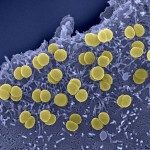Lien vers Pubmed [PMID] – 27567107
Lien DOI – S1473-3099(16)30253-510.1016/S1473-3099(16)30253-5
Lancet Infect Dis 2016 Nov; 16(11): 1288-1294
To combat Neisseria meningitidis serogroup A epidemics in the meningitis belt of sub-Saharan Africa, a meningococcal serogroup A conjugate vaccine (MACV) has been progressively rolled out since 2010. We report the first meningitis epidemic in Niger since the nationwide introduction of MACV.We compiled and analysed nationwide case-based meningitis surveillance data in Niger. Cases were confirmed by culture or direct real-time PCR, or both, of cerebrospinal fluid specimens, and whole-genome sequencing was used to characterise isolates. Information on vaccination campaigns was collected by the Niger Ministry of Health and WHO.From Jan 1 to June 30, 2015, 9367 suspected meningitis cases and 549 deaths were reported in Niger. Among 4301 cerebrospinal fluid specimens tested, 1603 (37·3%) were positive for a bacterial pathogen, including 1147 (71·5%) that were positive for N meningitidis serogroup C (NmC). Whole-genome sequencing of 77 NmC isolates revealed the strain to be ST-10217. Although vaccination campaigns were limited in scope because of a global vaccine shortage, 1·4 million people were vaccinated from March to June, 2015.This epidemic represents the largest global NmC outbreak so far and shows the continued threat of N meningitidis in sub-Saharan Africa. The risk of further regional expansion of this novel clone highlights the need for continued strengthening of case-based surveillance. The availability of an affordable, multivalent conjugate vaccine may be important in future epidemic response.MenAfriNet consortium, a partnership between the US Centers for Disease Control and Prevention, WHO, and Agence de Médecine Preventive, through a grant from the Bill & Melinda Gates Foundation.

